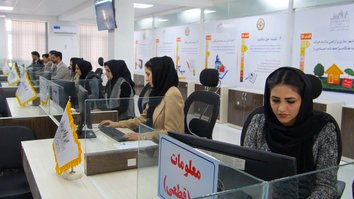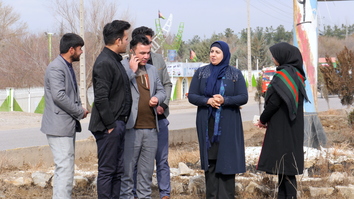HERAT -- Women in Herat Province are ascending to key leadership positions in the local government at an unprecedented pace, allowing them to play larger roles in deciding how to best help the region develop and prosper.
Positions held by women include deputy governor of Herat in charge of cultural and social affairs, director of economy, director of government accounts, director of the government printing press, director of women's affairs, manager of atomic energy, deputy mayor, deputy director of education and mayor of Injil District.
Women's role in government institutions is no longer just symbolic and most of the key government institutions in Herat are being led by women for the first time in Afghan history, said Munesa Hasanzada, deputy governor of Herat Province in charge of cultural and social affairs.
"It is the first time that a woman has been appointed deputy governor of Herat," Hasanzada said about her position. "It is the first time that the Department of Economy [in the province] is led by a woman, and it is the first time that women are managing a few important government institutions."
The presence of women in the leadership of government institutions has encouraged women to play a larger role in society, she added.
"Many women can conveniently go to the governor's office and other government agencies and publicise their problems," she said.
Four years ago, the only woman present in provincial administrative meetings was the director of women's affairs, but now a large number of woman directors are taking part and have a role in decision making, according to Hasanzada.
Thirty-four percent of civil servants in Herat Province, including teachers, are women, said Anisa Sarwari, director of women's affairs for Herat.
"Women's presence in key government positions in Herat Province has increased in the past two years," she added. "In previous years, most of the government institutions were run by men, but now the same institutions are led by women."
A golden opportunity
Women are taking advantage of the opportunity to showcase their capabilities and to play a role in the leadership of the Afghan government, said Wahida Azizi, director of the Herat Gender Affairs Department.
"Women hold government positions that, a few years ago, no one thought would be assumed by women," she said.
Women for the most part were confined to their homes between 1996 and 2001, when the Taliban ruled the country, she said. However, after an international coalition ousted the militants, women had the freedom to exhibit their skills and gradually expanded their role within the government in the past two decades.
"Afghan laws have given important roles to women in Afghan [government] institutions, which is making us hopeful," said Azizi. "According to the government's development goals, women's presence will increase to 30% in government institutions by 2020, which has already been achieved in Herat Province."
After the fall of the Taliban, "women have gained a big and unprecedented share of roles in government institutions in Herat Province," she added. "Providing leadership opportunities for women in government institutions has improved governance and public satisfaction with government."
Women can make an important contribution to the country's growth and development as well as curbing corruption in government through their roles in government, she said.
Naheed Rahmati, the director of economy for Herat Province, said her goal is to showcase the capabilities of Afghan women.
"I competed alongside men for this position, and I was selected as the director of economy for Herat after acquiring the highest marks," said Rahmati, who studied economics and management at Herat University and was appointed to her position three months ago. "I believe that women, like men, have the ability to lead in government and that they should be given the chance."
"I have worked for seven years in different positions at the Department of Economy," she said. "When I graduated from university, I started to work with this department at Grade 5 [a civil service rank], and as I proved my abilities and professional capabilities, I was able to achieve the leadership of this department."
Women's role in reducing corruption
After women started to lead government agencies, "corruption has considerably declined in those institutions," said Jilani Farhad, a spokesperson for the Herat governor.
"In recent years, hundreds of male civil servants were arrested on charges of corruption and abuse of authority, and they were prosecuted," he added. "In this entire period, not even one woman has been charged with corruption."
Sakina Hussaini, a member of the Herat provincial council, proposes granting key government positions to women as one way to curb corruption.
"Women in government have proved that they don't engage in corruption, and they are more focused on improving performance and management in government institutions," she said. "Women help carry out work in government agencies and deliver government services to the public."
"If the government gives more opportunities to women and grants them the leadership of revenue-generating agencies, such as customs, we will all witness a considerable drop in corruption in Afghanistan," Hussaini said.

![Munesa Hasanzada, Herat deputy governor in charge of cultural and social affairs, speaks at the opening ceremony of the 3rd exhibition of women's handicrafts in Herat city, Herat Province, October 9. [Marzia Farhad Ebrahimi/Facebook]](/cnmi_st/images/2019/11/07/20812-munesa-585_329.jpg)







We can accept women's right up to the limit that Islamic Sharia law has chosen for them, and no more.
Reply2 Comment
I will tell you something, either if you consider it as a joke or true but it is not good to give much time to women and the women may also stay satisfied with the 30% because if it increases and the women put both of their legs in one cuff [get determined] then they will turn to yesterday's Mujahideen and Mullahs [Taliban], as now whatever looting the Mujahideen do, they say that it is the prize they receive for their Jihad and resistance. Mullahs do not accept anyone's begging to sit and make peace. They follow whatever Pakistan tells them. In fact, when a human being goes beyond his limit he does either extremism or dissipation.
Reply2 Comment